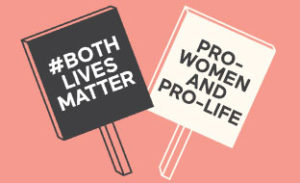A few weeks ago, a friend of our campaign saw an event on social media advertising an ‘Equality Debate’ about abortion as a workplace issue. From the information that was available, she noted that the speakers were both pro-choice activists. So she sent a very polite message to the Facebook page, asking a question concerning the nature of the ‘debate’ that was taking place (see Fig 1). As shown in the images below, she gave no indication of her personal stance on the topic of abortion, just asked a reasonable question in a friendly way. You can read the initial message and the response received from the organiser in the images below:
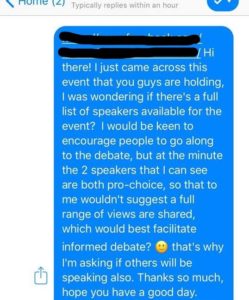
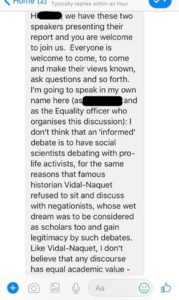
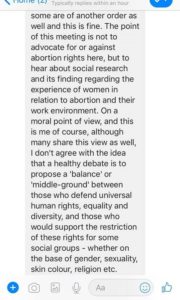
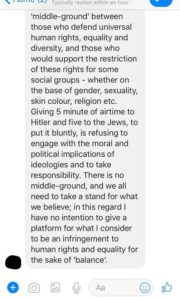
Whilst the respondent clarified that they were replying on a personal level, she also felt entitled to respond as the Equality Officer for the organisation holding the debate. This exchange raises numerous, serious concerns;
- We’ve protected the individual’s name here because in many ways the story is not about this one individual. It is about her wider role and influence as an academic and equality officer. This incident leaves us deeply concerned about the space available, for those who believe that both lives matter in academia, where much of what is taught there in social policy, finds it’s way into public life.
- This respondent is a teaching academic in social sciences at a Northern Irish University. She infers that there are no grounds to have an academic standpoint if you are ‘pro-life’ in this arena, despite the fact that the topic of abortion raises bioethical concerns which require serious, academic debate. This is reflected in the Northern Irish curriculum in GCSE RE, where young people are required to demonstrate in an essay, that they know and understand both sides of an ethical argument, such as abortion, before they can outline their personal conclusion. However, when a tertiary level academic offensively reduces pro-life academia to a “wet dream” of being viewed as scholastic, this should disquiet those who uphold that this terrain is worthy of substantive academic discourse and consideration. (The fact that 100,000 people are alive today – 5% of our population – who wouldn’t be had our laws been changed in 1967 should be an indication to the weight of this discussion).
- Besides academic deliberation, this raises concerns for students who are studying under such academics. Of course academics can and may hold strong viewpoints – this is not the issue being addressed – but academics who respond to a non-provocative question with such zealous hostility and won’t even entertain a question about space for dissenting viewpoint? How are students in this class likely to be treated by an academic who responds to a stranger by comparing holding a pro-life view to Nazism?
- Finally it’s important to say again, this extreme response was generated simply because someone saw an advert about a public debate and asked a question.
A formal complaint was made to the university concerned; that complaint has yet to be acknowledged.

